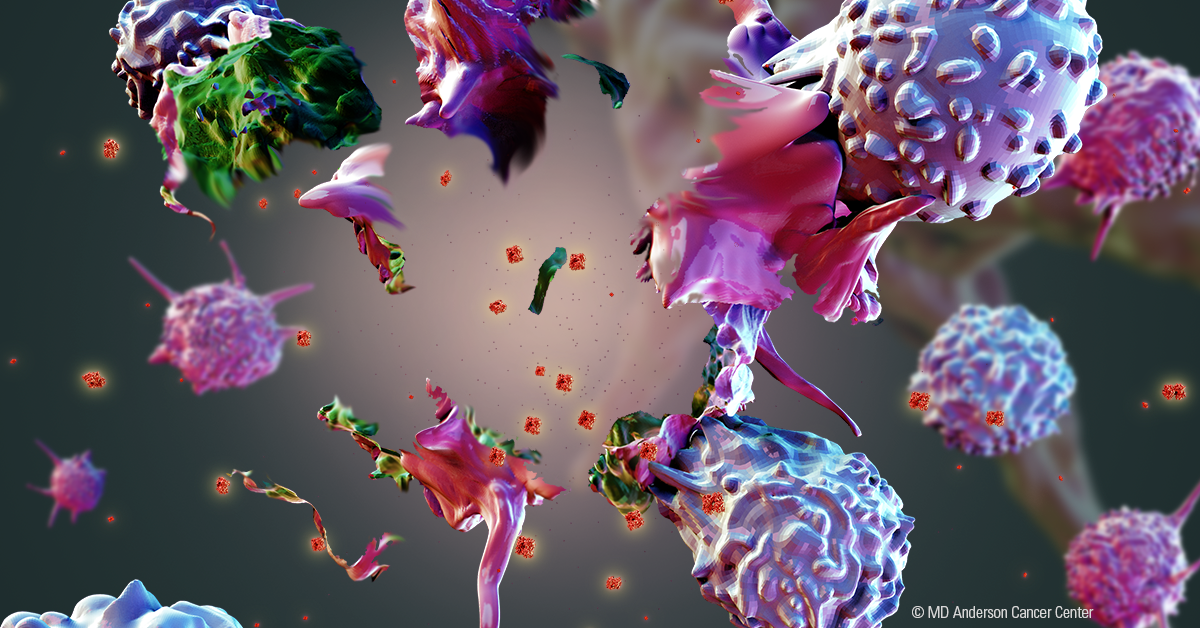- Diseases
- Acoustic Neuroma (14)
- Adrenal Gland Tumor (24)
- Anal Cancer (66)
- Anemia (2)
- Appendix Cancer (16)
- Bile Duct Cancer (28)
- Bladder Cancer (68)
- Brain Metastases (28)
- Brain Tumor (228)
- Breast Cancer (716)
- Breast Implant-Associated Anaplastic Large Cell Lymphoma (2)
- Cancer of Unknown Primary (4)
- Carcinoid Tumor (8)
- Cervical Cancer (154)
- Colon Cancer (164)
- Colorectal Cancer (110)
- Endocrine Tumor (4)
- Esophageal Cancer (42)
- Eye Cancer (36)
- Fallopian Tube Cancer (6)
- Germ Cell Tumor (4)
- Gestational Trophoblastic Disease (2)
- Head and Neck Cancer (6)
- Kidney Cancer (124)
- Leukemia (344)
- Liver Cancer (50)
- Lung Cancer (288)
- Lymphoma (284)
- Mesothelioma (14)
- Metastasis (30)
- Multiple Myeloma (98)
- Myelodysplastic Syndrome (60)
- Myeloproliferative Neoplasm (4)
- Neuroendocrine Tumors (16)
- Oral Cancer (100)
- Ovarian Cancer (170)
- Pancreatic Cancer (166)
- Parathyroid Disease (2)
- Penile Cancer (14)
- Pituitary Tumor (6)
- Prostate Cancer (144)
- Rectal Cancer (58)
- Renal Medullary Carcinoma (6)
- Salivary Gland Cancer (14)
- Sarcoma (236)
- Skin Cancer (294)
- Skull Base Tumors (56)
- Spinal Tumor (12)
- Stomach Cancer (60)
- Testicular Cancer (28)
- Throat Cancer (90)
- Thymoma (6)
- Thyroid Cancer (98)
- Tonsil Cancer (30)
- Uterine Cancer (78)
- Vaginal Cancer (14)
- Vulvar Cancer (18)
- Cancer Topic
- Adolescent and Young Adult Cancer Issues (20)
- Advance Care Planning (10)
- Biostatistics (2)
- Blood Donation (18)
- Bone Health (8)
- COVID-19 (362)
- Cancer Recurrence (120)
- Childhood Cancer Issues (120)
- Clinical Trials (624)
- Complementary Integrative Medicine (24)
- Cytogenetics (2)
- DNA Methylation (4)
- Diagnosis (228)
- Epigenetics (6)
- Fertility (62)
- Follow-up Guidelines (2)
- Health Disparities (14)
- Hereditary Cancer Syndromes (122)
- Immunology (18)
- Li-Fraumeni Syndrome (8)
- Mental Health (118)
- Molecular Diagnostics (8)
- Pain Management (62)
- Palliative Care (8)
- Pathology (10)
- Physical Therapy (18)
- Pregnancy (18)
- Prevention (890)
- Research (390)
- Second Opinion (74)
- Sexuality (16)
- Side Effects (602)
- Sleep Disorders (10)
- Stem Cell Transplantation Cellular Therapy (216)
- Support (404)
- Survivorship (322)
- Symptoms (184)
- Treatment (1770)
Colorectal cancer researchers focus on minimal residual disease to guide treatment
4 minute read | Published November 02, 2020
Medically Reviewed | Last reviewed by an MD Anderson Cancer Center medical professional on November 02, 2020
Minimal residual disease (MRD) is a term commonly used with blood cancers that describes a small fraction of cancer cells that remain or come back after treatment. MRD doesn’t cause symptoms and isn’t detectable by standard clinical tests, such as CT scans or blood tests.
In solid tumors, MRD can refer to cancer cells in the blood, small metastases in the body, or a small portion of the primary tumor remaining after treatment. The presence of minimal residual disease predicts worse clinical outcomes, so it’s important to detect MRD and intervene in its earliest stages.
Arvind Dasari, M.D., helps lead a project focused on better understanding and treating minimal residual disease in patients with colorectal cancer. He spoke with us about this research.
Why are you interested in MRD for patients with colorectal cancer?
Treatment for patients with locally advanced (stage II or III) or resectable metastatic (stage IV) colorectal cancer typically begins with chemotherapy and/or radiation therapy, followed by surgery and then additional therapy, usually more chemotherapy.
We then monitor the cancer by testing the blood for a tumor marker called CEA and conducting scans every few months. Unfortunately, if we detect recurrences based on CEA or the scans, it’s usually an advanced disease.
Therefore, we are studying MRD in colorectal cancer to answer two questions:
- Can we use MRD to determine if a patient needs additional chemotherapy after surgery?
- Can we detect recurrences earlier, giving us a chance to intervene and improve outcomes?
How would you detect minimal residual disease in patients with colorectal cancer?
We look for DNA in the blood and try the small fragments released from the tumor. This is called circulating tumor DNA. We have sophisticated tools to distinguish between DNA from normal cells and the tumor, so that we can focus on analyzing the tumor DNA.
The idea is that if we’re able to detect any of this tumor DNA after a patient has had treatment, then we know there is residual cancer somewhere that we’re just not able to pick up on scans.
What would that mean for a patient’s treatment?
That is a question we are actively researching.
Right now, all patients have treatment, usually chemotherapy, after surgery. We know some are cured with surgery alone and, in others, this chemotherapy doesn’t prevent recurrence. So, there are patients that don’t benefit from the post-surgical therapy but still experience all the side effects. We would like to be able to make decisions, based on this tumor DNA in the blood, so we can determine whether certain patients need additional therapy or not. We are designing clinical trials to answer this question.
We want to know if patients treated with pre-surgical therapy, surgery and post-surgical chemotherapy should have additional treatments if we find signs of MRD.
How will your MRD research allow clinicians to improve treatments and results for colorectal cancer patients?
We’re taking a three-fold approach to studying MRD. Our early work was supported by MD Anderson’s Colorectal Cancer Moon Shot®, which helped get us to where we are today.
First, we’re working to develop a better test at MD Anderson to find tumor DNA in the blood. We have found a panel of genes that allows us to identify the vast majority of patients with colorectal cancer. Now we’re working to refine this test so that it will work on very small amounts of tumor DNA.
Secondly, we don’t have good data in the field on what MRD means for patients. In order learn more and better answer our key questions, we’ve launched a clinical study in Texas and within MD Anderson Cancer Network®. We plan to follow about 1,000 patients from diagnosis throughout treatment and afterward. We’ll take blood samples from them over time and look for tumor DNA, which we can eventually correlate with clinical outcomes. We’ve received funding for this study from the Cancer Prevention and Research Institute of Texas (CPRIT).
Finally, we want to develop better treatment options for patients that have MRD after standard colorectal cancer therapy. We’re studying the portion of tumor remaining after pre-surgical therapy – which is essentially MRD – and trying to learn why it is resistant to treatment. We are working closely with the TRACTION platform to identify and test new treatment targets for these resistant cancers. Based on the data emerging from these and other studies, we have also initiated pilot clinical studies to treat patients with evidence of MRD.
Request an appointment at MD Anderson online or by calling 1-866-411-5384.
Related Cancerwise Stories

We would like to be able to make decisions, based on this tumor DNA in the blood, so we can determine whether certain patients need additional therapy or not.
Arvind Dasari, M.D.
Physician & Researcher





